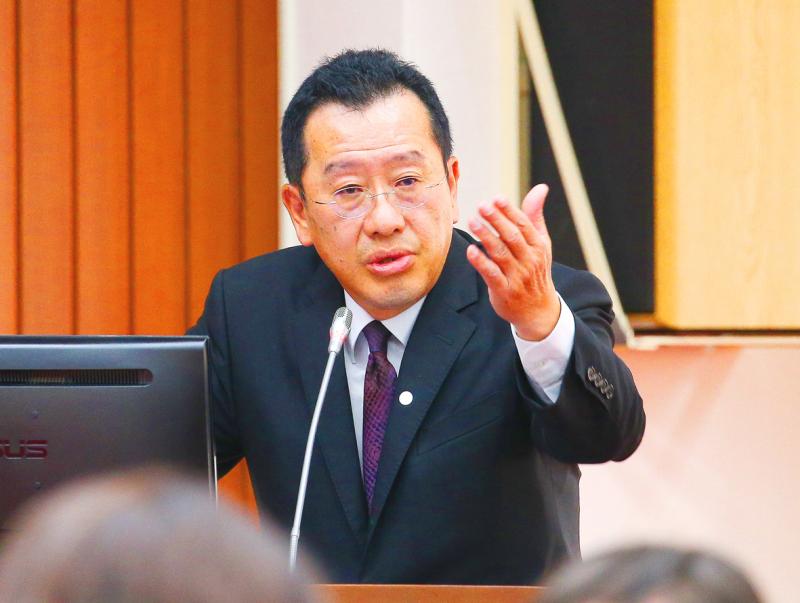The Financial Supervisory Commission (FSC) yesterday announced a short-selling ban on the Taiwan Stock Exchange and the Taipei Exchange (TPEX), starting today, as it attempts to curb speculative trading amid “irrational declines on the stock market.”
Unlike previous bans imposed in 1998, 2008 and 2015, which applied to all stocks, this ban applies only to stocks that showed a decline of 3.5 percent or more a day earlier, Securities and Futures Bureau Deputy Director Sam Chang (張振山) told a news conference in New Taipei City.
The TAIEX fell 5.83 percent and the TPEX dropped 7.53 percent yesterday, and 1,233 stocks on the two boards reported declines of more than 3.5 percent, the commission’s data showed.

Photo: CNA
Tech heavyweights Taiwan Semiconductor Manufacturing Co (台積電) and Largan Precision Co (大立光) fell 3.69 percent and 9.72 percent respectively.
Short selling is when investors borrow securities, typically from brokerages, and then sell them, expecting the price will fall, to make a profit by buying them back later for less money.
“A short-selling ban can prevent speculators from betting against financial stocks, but it may also create more fear among ordinary investors. It is difficult to foresee if the measures would help,” an analyst told the Taipei Times by telephone on the condition of anonymity.
Short selling for the 1,233 stocks would be banned today, Chang said, adding that the number of stocks subject to the new measure would vary daily.
The ban would persist for stocks that continue to fall by 3.5 percent or more, he added.
“We want to curb volatility in the local markets amid a sell-off prompted by the fear of COVID-19, allowing respite for battered equities,” Chang said. “The local market appeared irrational, but not that crazy as it was in the [2008] financial crisis.”
Given that turnover on the main board stood at NT$269.74 billion yesterday, higher than the daily average of NT$146 billion last month, it indicated that many investors still had confidence in the local market, he said.
“Average daily turnover was less than NT$50 billion during the worst period in 2008. So the situation is much better now,” Chang said.
The FSC did not say how long the short-selling ban would last, saying that it would review the ban based on the COVID-19 pandemic situation.

Hon Hai Precision Industry Co (鴻海精密) yesterday said that its research institute has launched its first advanced artificial intelligence (AI) large language model (LLM) using traditional Chinese, with technology assistance from Nvidia Corp. Hon Hai, also known as Foxconn Technology Group (富士康科技集團), said the LLM, FoxBrain, is expected to improve its data analysis capabilities for smart manufacturing, and electric vehicle and smart city development. An LLM is a type of AI trained on vast amounts of text data and uses deep learning techniques, particularly neural networks, to process and generate language. They are essential for building and improving AI-powered servers. Nvidia provided assistance

GREAT SUCCESS: Republican Senator Todd Young expressed surprise at Trump’s comments and said he expects the administration to keep the program running US lawmakers who helped secure billions of dollars in subsidies for domestic semiconductor manufacturing rejected US President Donald Trump’s call to revoke the 2022 CHIPS and Science Act, signaling that any repeal effort in the US Congress would fall short. US Senate Minority Leader Chuck Schumer, who negotiated the law, on Wednesday said that Trump’s demand would fail, while a top Republican proponent, US Senator Todd Young, expressed surprise at the president’s comments and said he expects the administration to keep the program running. The CHIPS Act is “essential for America leading the world in tech, leading the world in AI [artificial

DOMESTIC SUPPLY: The probe comes as Donald Trump has called for the repeal of the US$52.7 billion CHIPS and Science Act, which the US Congress passed in 2022 The Office of the US Trade Representative is to hold a hearing tomorrow into older Chinese-made “legacy” semiconductors that could heap more US tariffs on chips from China that power everyday goods from cars to washing machines to telecoms equipment. The probe, which began during former US president Joe Biden’s tenure in December last year, aims to protect US and other semiconductor producers from China’s massive state-driven buildup of domestic chip supply. A 50 percent US tariff on Chinese semiconductors began on Jan. 1. Legacy chips use older manufacturing processes introduced more than a decade ago and are often far simpler than

Gasoline and diesel prices this week are to decrease NT$0.5 and NT$1 per liter respectively as international crude prices continued to fall last week, CPC Corp, Taiwan (CPC, 台灣中油) and Formosa Petrochemical Corp (台塑石化) said yesterday. Effective today, gasoline prices at CPC and Formosa stations are to decrease to NT$29.2, NT$30.7 and NT$32.7 per liter for 92, 95 and 98-octane unleaded gasoline respectively, while premium diesel is to cost NT$27.9 per liter at CPC stations and NT$27.7 at Formosa pumps, the companies said in separate statements. Global crude oil prices dropped last week after the eight OPEC+ members said they would